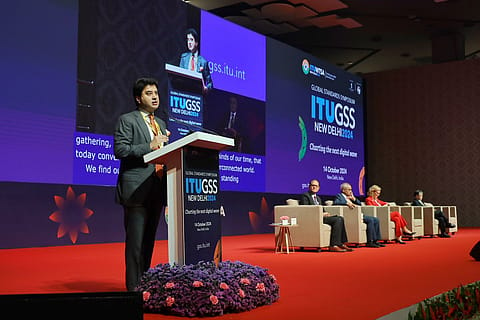5G to inject ₹3,783 cr into Indian economy by 2040: Jyotiraditya Scindia
Scindia emphasised that the 5G network is not merely about faster internet, it is also about laying the groundwork for intelligent cities.

5G rollout in India is anticipated to inject over $450 billion (approximately ₹3783 crore) into the economy by 2040, Union communications minister Jyotiraditya Scindia said at the inauguration of Global Standards Symposium organised by the International Telecom Union in New Delhi on Monday. During his address, Scindia emphasised that the 5G network is not merely about faster internet or low latency, it must further be attributed to laying the groundwork for intelligent cities, infrastructure and autonomous innovation.
"In India alone, for example, 5G is anticipated to inject an astounding 450 billion dollars into the economy by 2040. We have rolled out 5G across all the 36 states and union territories (of the country) across 96% (of our) districts and 80% of our population in just 22 months, (this) highlights the transformative power of standardisation of technology,” Scindia said.
The Global Standards Symposium is a high-level conference by the International Telecommunication Union, a UN specialised agency, for information and communication technologies (ICT), comprising over 194 member nations with over 1,000 companies, universities, and organisations.
Scindia further emphasised the need for ethical guidelines and robust regulation in AI and IoT deployment, warning that governance cannot be an "afterthought."
“AI is reshaping how we process (our) information. AI Deployment must be (hence) guided by ethical consideration and a robust regulatory framework. Governance of AI cannot just be an ‘afterthought’, and it must address concerns of bias, privacy and transparency ensuring these technologies serve as a force for good,” Scindia said.
The minister highlighted India's approach to technology, citing the rollout of 5G, the India global stack, UPI, Aadhaar, and the DigiLocker which stores 6.75 billion documents for 300 million users. He emphasised that these initiatives are designed to promote international participation and ensure inclusivity, ensuring no citizen is left behind in accessing these technologies.
Doreen Bogdan-Martin, ITU Secretary-General, noted that the rise of AI is one of the reasons why standards are top priority today. These are more than “mere technical specifications" which she says play a crucial role in interoperability and in the safe AI and tech deployment.
Recommended Stories
He emphasised the role of international collaboration in unlocking the full potential of technologies such as 5G, AI, and IoT, with global standards key to ensuring seamless cross-border functionality. Scindia called for a comprehensive policy framework to ensure innovations like 6G benefit everyone equitably, avoiding deepening digital divides, and urged the global community to work together in setting standards and fostering partnerships for a future where technology serves the common good.